Lack of communication leads to iNite confusion
Blending into the darkness with black clothing, members of Poi club light up the iNite 2016 stage.
December 2, 2016
Namaste officers sent eight of Jefferson’s student-run clubs an email on the evening of Nov. 20, notifying them that their acts would not perform in iNite 2017. The email was sent to Poi Club, American Sign Language (ASL), Latin Club, Show Choir, Manchoir, Sirens and Ballroom Dance.One of Black Student Union’s (BSU) two acts, Hip-Hop, was also cut.
“Due to Administration concerns, we have been forced to cut acts that are not registered in FCPS as cultural clubs,” the email said. According to leaders of removed acts, though, the email did not sufficiently explain the causes of such large-scale cuts.
Namaste first held iNite, short for “International Night,” in Jefferson’s auditorium around 16 years ago. According to Programs Specialist Joan Burch, exchange of cultural food took center stage over small performances of about five performers. “In the past, during the intermission, people would run to the gym to get the food,” Burch said.
Since then, iNite has expanded to include more and more students and extracurricular organizations, causing concern among Jefferson faculty and staff. Though the show included 28 acts last year, with some clubs’ acts running as long as 8 minutes, Namaste officers plan to include only 17 acts this year.
Two iNite shows will occur on Sunday, March 12, at George Mason University. Senior Ria Sonawane, Namaste’s current president, is in the process of planning iNite with new restrictions that will affect the entire body of iNite participants, not just the acts that were cut.
“We have a new limit where there can only be 120 performers performing per act, each performer can only perform in four acts, and then [we have] the four minute act limit,” Sonawane said.
A new system, the iNite Board, will track student and club participation in order to enforce the rules and to streamline planning.
“It’s a way for acts to give us all their info online. Right now, we’re giving them their login information so that they can give us their basic rosters and the general act information by December 16, which is the first deadline,” Sonawane said.
After Namaste officers notified junior William Hoganson, president of Poi club and an officer of BSU, that Poi and BSU’s hip-hop act were cut, he created a closed Facebook group called “Unite” with other leaders of clubs who had been cut.
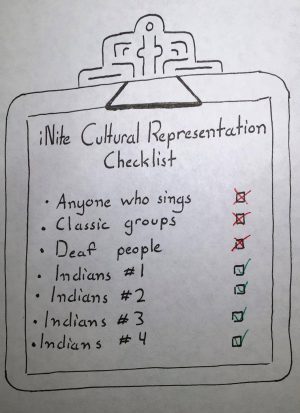
The group has been active since its creation on Nov. 20; as of Dec. 2, it has 81 members. Club leaders discussed whether they aimed to rejoin iNite, or simply to find another performance venue. After Hoganson added Sonawane on Nov. 21, she notified club leaders that she would attend a Dining with Doc meeting, which Jefferson’s Student Government Association (SGA) regularly schedules, to ask Principal Evan Glazer about iNite decisions. Many of the club leaders decided to attend the meeting as well. Pou felt confused that club leaders brought their complaints to Glazer instead of to her and the student activities coordinators.
“There [have] been so many meetings about this, but the people who really know the answers have not been invited,” she said. “We have not been invited to any meeting—Ms. Burch hasn’t, I haven’t. [Club leaders are] not helping each other. All these meetings [to which] no one had invited us are going on without us being present in order to explain the changes.”
According to Burch, concerns from faculty and staff alerted her to the widespread impacts of iNite’s expansion over two years ago. She consistently receives negative feedback in end-of-the-year eighth period surveys. “I get a lot of concerns from staff about the time demands that iNite practices take and how it kind of overtakes the activities program,” Burch said.
“We also had complaints from a lot of teachers because iNite became the main topic of students’ lives,” Pou said. “[Students would say], ‘Oh, I didn’t do my homework because I had iNite rehearsal.’”
The size of the audience and of the body of performers also prompted numerous issues with the venue of the show. Last year, Namaste sold 3,000 tickets for their two shows on Sat., April 2. The evening show sold out within an hour. During discussions last year, Namaste officers, the club sponsor and eighth period officers focused on cutting the show down by moving it to Jefferson.
“When it was at TJ, the size of our facility kind of naturally limited what could happen,” Burch said.
However, Namaste officers believe that the show has eclipsed a manageable size for Jefferson’s auditorium.
“The first problem we had was that admin wanted to make iNite at TJ, which we knew wasn’t possible because TJ only seats 700 people, so there’s no way we could keep up all the demand for tickets, so we had to talk to Mr. Hodges and convince him,” Sonawane said.
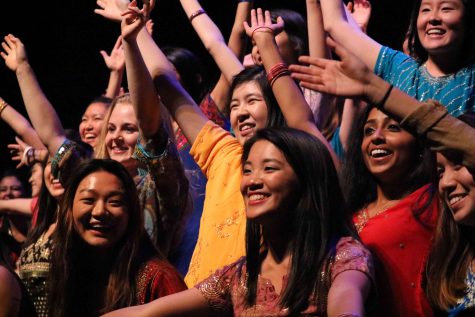
Students slide to the front of the stage in the finale of iNite’s Namaste Senior Girls act.
The pressure on the length of the show influenced regulations. Last year, the evening show ran from seven P.M. until around 11:30 P.M.
“We cannot have a show longer than three hours,” Pou said. “We can only go by experience. The future, we cannot tell. The only future we can control is the length of the show.”
Time has become a serious issue with iNite; as the performance has expanded, adding new acts each year such as Latin Club, Jewish Culture Club and SLAVA in 2016, and as student-performers have taken on more and more acts, rehearsals have encroached upon traditional learning time as well as space, a limited commodity at Jefferson as it has undergone construction, creating safety hazards.
“They are not supposed to stay after school unless there’s an adult there and they were staying all over the place without anyone,” Pou said. “That’s a liability to FCPS if anything happens. This is why we have to have parents sign a form saying that TJ wouldn’t be liable if they hurt themselves practicing. When they are practicing in the hallway, that’s dangerous.”
There were concerns over how iNite can seem to overshadow academics during the height of rehearsal commitments.
“Now that we’re doing exam retakes during eighth period, that’s going to suffer. How are we going to schedule rehearsals and exam retakes?” Pou said.
“For some kids, it was impacting their grades negatively,” Burch said. She also referred to iNite as “by far, the biggest single source, right now, of absences.”
These issues, gradually compounding in the eyes of the Student Activities office, evolved into discussions on how to adapt iNite into a more manageable size. Burch decided to gather faculty, staff and students who could address these grievances.
“[I brought] in Mr. Hodges and the Namaste leadership at that time, and Señora Pou about how to address those staff concerns. And over at least two years of talking, mostly with Dhruv and Andy, who are gone, we had a lot of back and forth [discussion].”
From 2013-2016, Namaste officers, led by Dhruv Gupta, Namaste president from 2014-2016, and Andy Charbonneau, vice president from 2015-2016, explained that each new group of officers had to interpret and maintain the legacy of iNite as a cultural event.
“Many times, all the officers differ on where iNite should lie on this [cultural] spectrum and the final show logistics result from discussion and compromise between the officers and administration,” Charbonneau said.
Once the issues had been identified, Namaste began to discuss the methods with which they could achieve the goal of reducing the size of iNite, as well as its impositions on time and resources. While these conversations occurred seriously and often last year, Burch stipulates that administrators allowed Namaste to choose.
“There was no hard edict given to Namaste. Ultimately, the decisions were theirs,” Burch said.
However, according to Sonawane, though Namaste officers did have a significant role in discussing regulations, they did not have the final say on who received the email.
“Namaste officers themselves didn’t decide who to cut. We were given a list. [Pou’s] rule was that clubs had to be FCPS cultural clubs. [For example,] as deemed by FCPS, Persian is a cultural club, but Ballroom isn’t,” Sonawane said.
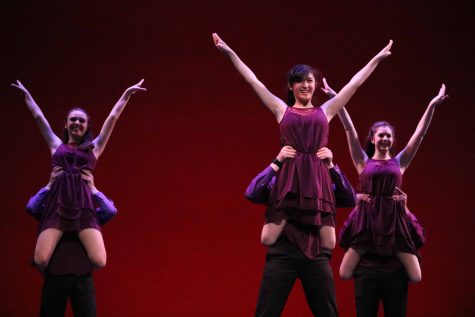
From left: Juniors Alynne Cutler and Katherine Barbano and sophomore Chrissy Blake perform in Ballroom Dance during iNite 2016.
Pou confirmed, saying she had asked Burch for a list of all clubs in iNite last year with their “cultural” or “non-cultural” designation, then she cut acts labeled “non-cultural.” But because FCPS does not publish its criteria for what qualifies an extracurricular activity as a culture club, the justification in the email, “We were forced to cut all clubs registered in FCPS as non-cultural clubs,” confused club leaders.
“They said it was based on official FCPS listings as ‘a culture club’ [or] ‘not a culture club,’ which really shocked us, because there is no box you can check when filling out the constitution,” Hoganson said of the club leaders in his Unite Facebook group.
Burch does not assign the designation, but she can see how clubs were classified by the county for TJ.
“When the paperwork for starting a new club goes to the county, the county designates the club as cultural, special interest, performance arts, [etc],” she said. “I have all the club paperwork and I have a matrix that says who’s a cultural club and who isn’t. I can’t speak to what criteria they use.”
However, the county only began requiring paperwork from special interest clubs in 2013. Therefore, special interest groups who were established before then were not classified by the county.
“There are some groups that could be cultural in nature who don’t have that official designation because their paperwork never went to the county because they were established in 2001,” Burch said.
Currently, FCPS-designated cultural clubs such as Jewish Culture Club, Vietnamese Student Association and American Swing Dance remain in iNite, as well as French, Spanish, German, Chinese, and Japanese National Honor Society.
On the other hand, Ballroom, Poi, Urban Dance and all three of the choir groups are registered as Fine or Performing Arts clubs. ASL and Latin Culture Club, which also did not make the list, were established at TJ before 2013 so did not receive a category designation from the county. According to Burch, in looking at the designation given to the same or similar groups at other schools, neither would be considered cultural in nature. They are in Burch’s system as language clubs. “Language [clubs] are separate from culture [clubs], as far as the county [categorization] goes,” Burch said.
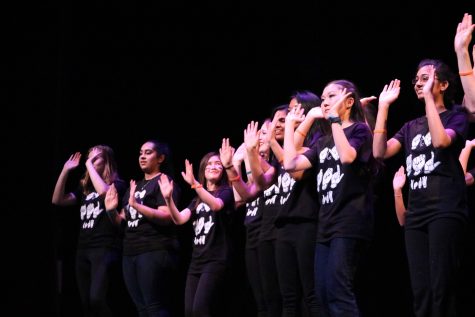
Members of ASL act out the lyrics of Macklemore’s “Can’t Hold Us” during iNite.
That anomaly—that Urban Dance remained while all other officially performance arts clubs were cut—has further baffled and even frustrated students.
“They left in Urban Dance, but asked us to remove BSU hip-hop?” Hoganson said. “If you’re looking at cultural there, [BSU is] an actual culture club.”
Pou cut BSU’s hip-hop act in order to limit the club’s total time to four minutes instead of two eight-minute acts. She did not prohibit BSU from performing step, hip-hop or both within those four minutes. As for Urban Dance, she felt that it was a common-sense decision to include it in iNite as an extension of black culture. Regardless, choosing which clubs to leave out was difficult for Namaste, Pou and eighth period administrators.
“When we made the decision, it was painful. I cut Namaste also,” Pou said, referring to the removal of the Namaste Couples act, which had performed the finale in recent years of iNite. “I had to fight them, but everybody needs to make sacrifices. ”
Pou often emphasized the mission of the Activities program at Jefferson when explaining decisions in cutting down the size of iNite. The issue that drove the most decisions and concerns of both Pou and Burch is the way in which they feel that iNite has overtaken the mission of the eighth period office and its clubs, as rehearsals have consumed larger and larger segments of the school year.
“They’re not performing their eighth period commitment and then all of a sudden, all that matters is iNite. That’s my big problem,” Pou said.
Burch held a similar opinion.
“It’s disappointing to see the mission of the club fall away because the energy and resources of leadership [are] being spent on a performance. And that’s not really how this program was intended. It was here when the school was started so that you guys had an opportunity for experience and leadership outside of the classroom and certainly performing arts is one of them, but our performing arts programs are not very big,” Burch said.
But Hoganson feels that for Poi, one of the largest acts from previous iNite performances, those concerns about the size and mission of the club are not valid.
“Not many people know this, but poi is a performance art practiced by the Māori tribe,” Hoganson said. “We have over 50 members. Our [meetings are] full every week. That is because students come, they learn, they enjoy it, and then at iNite we get to perform and all of the students who aren’t part of it get to see a part of a different culture, a different thing that they’ve never heard of and never seen before and probably never would have heard of if we didn’t perform and take action.”
Hoganson made his goal to find some kind of performance space for his clubs, even if they could not perform at iNite, but he has not succeeded.
“The clubs that were cut—as soon as we were told, we started looking for alternative venues. We started looking for places where we could perform, we could reach out, and we could still get together but again, it’s December. We’re having a really hard time finding, setting up and organizing these types of venues,” Hoganson said.
Hoganson wishes that iNite choreographers and club leaders had a role in the decision-making process.
“If we had been told last [school] year, this would not be an issue. If we had been talked to at all, this would not be the huge issue that it is.”
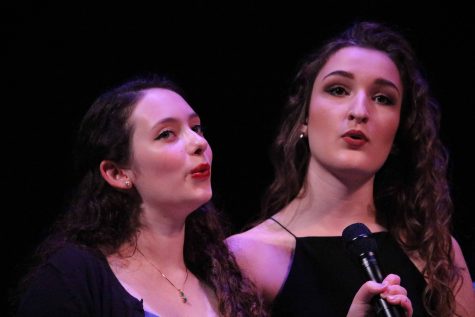
Knowing that performance arts clubs still want events to showcase their dances, the Student Activities office plans to host a talent show for the first time in recent years, which previously would have hosted acts of around five people each,
“We have recruited the sophomore class to have a talent show,” Burch said. “The talent show had also been a forum for people to showcase their talents without needing to have a cultural aspect and that went away when we lost the auditorium. So, by bringing it back, we’re hoping to give some of these groups that can’t perform at iNite a chance to showcase.”
Hoganson and other club leaders in the “Unite” Facebook group believe the talent show is not a feasible option for hosting all of the acts that were cut, including Poi and ASL, two of the biggest acts in iNite last year.
“It’s just not a big enough venue. Yes, we could perform; we’d just make up most of the audience. They’re preventing students from participating in iNite because they think there are too many students in iNite, and I think that’s awful.”
According to Pou, clubs have prevented discussion from moving forward because they have sought to find administrators to speak with instead of attempting to compromise with each other. As a solution, she has considered asking clubs with similar cultures to combine into one, four-minute act.
“They’re not willing to work together, so all they’re doing is running around being upset with us,” she said. “Why can’t we combine them? [Because] nobody wants to give up anything. Now, we’re trying to bring back the talent show, but they don’t want that. If what you want to do is showcase your talent, the venue doesn’t matter,” Pou said.
According to Pou, the fluctuation in club membership around iNite rehearsal season illustrates most clearly the way in which iNite can sometimes derail the clubs’ original purposes.
“My biggest concern—we have these clubs where their attendance is maybe nine members and the minute they start rehearsing for iNite, they have 60, 70 [members],” Pou said. “And they swear that they are advancing the cause of the club. If they’re advancing the cause of the club, why is it that, right after iNite, their attendance goes back to their original number?”
Regardless of concerns and frustrations with the current size of iNite, Burch recognizes it as a valuable part of Jefferson student life and can see why clubs that were cut are upset.
“I think the show is great, I think the energy is really great. I think it’s just a little too dominant,” Burch said. “I understand their disappointment.”
Sonawane speaks for many students who are surprised by this year’s changes. “It’ll still be iNite, but it’s not going to be everything it once was.”






